The Pittsburgh Press (December 17, 1945)

Simms: Our China policy
By William Philip Simms
WASHINGTON – President Truman’s statement on China policy, old China hands say, is a two-edged sword which can cut the ground from under either the Chinese Communists or the National Government, depending on a number of “ifs.”
If the Communists agree to merge their Army with the National forces, and Generalissimo Chiang Kai-shek then refuses to broaden his government to include other political groups, he will find himself on the spot. Clearly, he could no longer expect aid from the United States.
If, on the other hand, the Communists ignore the president’s polite plea to cease hostilities and amalgamate their armies with the Chinese regulars, national unity wall remain impossible. Blame would be laid on their doorstep.
Aid depends on unification
There is still another “if.” If the United States refused aid to China because unification had been prevented by the Communists’ insistence on an army of their own such refusal almost certainly would doom the generalissimo. Without American aid China would face chaos and that would play into the hands of the Reds – especially if they retain their arms, now strengthened by recently acquired Jap equipment.
Thus, it is pointed out, the president’s policy can hardly be as inflexible as some seem to think. True, he indicated that future American loans and credits to China would depend on unification, and the “broadening” of the Chungking regime to include the Communists. But should unity fail as the result, say, of the Communists’ refusal to give up their army, it would hardly be fair to blame the National Government and so deny it assistance.
This is regarded as important because, hitherto, efforts at unity always have failed on this issue of a single, national army. As President Truman stated, “the existence of autonomous armies such as that of the Communist army is inconsistent with, and actually makes impossible, political unity in China.” The generalissimo has always said the same thing. But while he has more than once offered to take Communists into his government, grant a considerable degree of local autonomy in Red districts, and so on, agreement has consistently failed on the army issue at the last minute.
Squarely up to Communists
Chinese circles say the generalissimo will go along with President Truman. In fact, they observe, he made this clear as long ago as last September. Shortly after V-J Day he announced a three-point program: (1) Amelioration of the lot of farm and factory workers; exemption from land tax and a 25 percent reduction in land rent. (2) Inauguration of constitutional democracy; early convocation of a peoples’ assembly, freedom of speech and association. (3) National unification and nationalization of all armed forces in the country
The president’s statement, therefore, would now seem to put it squarely up to the Communists. At the same time, he has put a powerful weapon in their hands.
Some Chinese dissidents do not want help from the United States – if the help goes to the National Government. For more than a decade they have maintained an army in the field, to overthrow that government. Without help, the plight of the Chinese will rapidly become such that the government may find itself so unpopular that a little push might send it toppling.
But even now, Gen. Marshall is on his way to Chungking. In his new ambassador, the president will have a top-notch diplomat to carry out American policy and advise him on future interpretation.